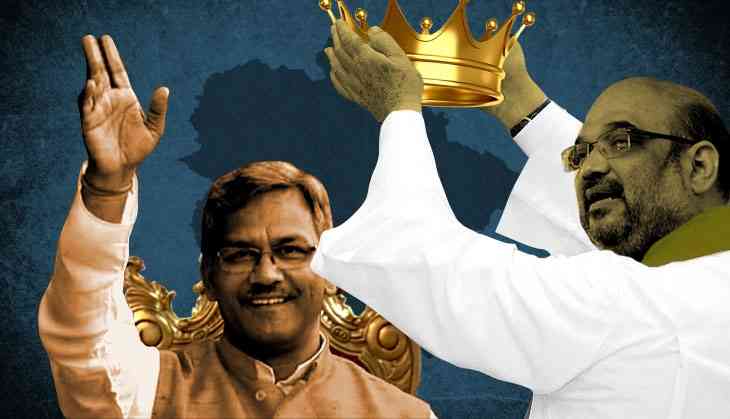Trivendra Rawat is Uttarakhand CM, thanks to RSS and proximity to Shah

A strong Rashtriya Swayamsevak Sangh (RSS) background and close proximity to the Bharatiya Janata Party's (BJP) top central leadership has worked in favour of Trivendra Singh Rawat, and ensured his coronation as the new Chief Minister of Uttarakhand.
He was chosen over Satpal Maharaj and Prakash Pant, the two other main contenders for the post, at a meeting of BJP MLAs in Dehradun on Friday afternoon.
Rawat won the recent polls from the Doiwala seat, where he defeated Congress heavyweight Hira Singh Bisht by a handsome margin.
He will be taking oath as the new CM at a function at Parade Ground in Dehradun on Saturday.
Both Prime Minister Narendra Modi and BJP's national president Amit Shah are expected to attend the swearing-in, ceremony for which preparations are already underway.
The CM's background
Rawat was an active pracharak of the RSS from 1983 to 2002, when he contested the Doiwala seat successfully for the first time. In the BJP regime that took over from 2007 to 2012, he had again represented the constituency, and was agriculture minister of the state.
He worked in close co-ordination with Modi when he was the national secretary of the BJP in-charge of Uttarakhand. This was followed by his being a core member of Shah's team ever since he took over as the BJP's national president.
Observers say Rawat had worked overtime with Shah to ensure BJP's resounding victory in Uttar Pradesh in the 2014 Lok Sabha polls. Thereafter, he was put in charge of the Jharkhand unit of the party, and he once again ensured a BJP victory in the Assembly polls that were held in November 2014.
The soft-spoken Rawat is known for his no-nonsense approach to work, and keeping the bureaucracy on its toes. He also represents the powerful Rawat lobby of Garhwal.
It is said that the BJP wanted to choose a face from the Garhwal region as CM. Throughout its campaign in Garhwal, its workers on the ground had played up the sentiment that Garhwal had never got its due. Party workers had also played up the appointment of General Bipin Rawat as the Chief of Army Staff, and Ajit Doval as National Security Advisor. Both are Garhwalis, a region where the BJP has traditionally had a huge support base.
The only blot against the new CM is that his name had figured in the Dhaincha seed scandal that had rocked the previous BJP regime. But he is yet to be indicted in the scandal.
RSS influence
The RSS has always had a major influence in the BJP government formation in the state. Observers say that Uttarakhand is one of those ideal states for the RSS-influenced BJP brand of politics. It is a state where barring three districts of Haridwar, Udham Singh Nagar and Dehradun, there is hardly any presence of minorities.
In addition to this, the hill districts are dominated by upper caste Hindus, comprising Brahmins and Rajputs. There are hardly any Dalit-dominated areas in these districts.
The very first Chief Minister of the state, Nityanand Swami, who led the interim government from 2000-02, had a strong RSS background. Thereafter, three BJP Chief Ministers – Bhagat Singh Koshiyari, Ramesh Pokhariyal 'Nishank' and now Rawat have RSS backgrounds. Major General (Retired) BC Khanduri was the only odd man out, although even his government was influenced by the RSS.
The other contenders and why they lost out
Godman Satpal Maharaj was seen as a frontrunner for the post when the race had begun after the BJP won 57 of the 70 Assembly seats in the state when the results were declared on 11 March.
Observers say he would have been the best choice for the BJP, given his accessibility and the ability to take everyone along. However, the biggest drawback for him was that he had come from the Congress, even though he was the first to jump ship, ahead of the 2014 Lok Sabha polls.
Satpal's desire to become CM remains unfulfilled for now despite his having developed a good equation with both Modi and Shah. If his Congress background is ignored, his image fits that of an ideal CM that the RSS could have wanted in the state.
Towards the final stages, the race for the post of CM had narrowed down to two contenders – Rawat and Pant, the face of the party in Kumaon.
Like Rawat, Pant also has an RSS background. It is said he had one big advantage over Rawat – his experience of the legislative functioning of the Assembly, given that he has been Speaker as well as a minister. But Rawat's longer association with the RSS and his proximity to Shah worked to his advantage.
Challenges before Rawat
Rawat's challenges have just begun. His first major challenge would be choosing his cabinet. This will be a tedious task, given the fact that there are too many claimants, including those Congress heavyweights who won on BJP tickets, for the ministries.
Then he would have to strike a balance between the Garhwal and Kumaon regions. He would also have to give due representation to the winners from the plains and the Terai region, as this is the second consecutive time that these regions have returned maximum BJP MLAs.
Besides, Rawat will also have to balance the caste equations in this state, which has been politically volatile right from the day of its inception.
First published: 17 March 2017, 18:25 IST
